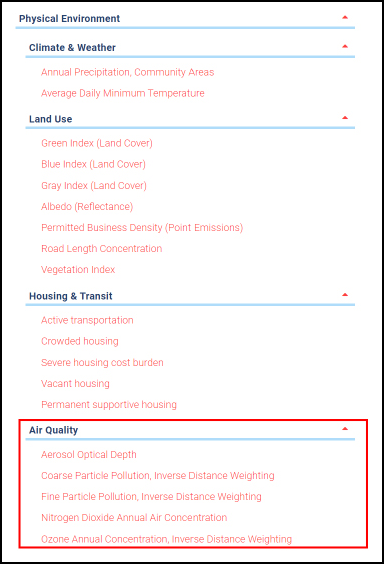Chicago Health Atlas Adds Air Quality Data
Air quality data is now available on the Chicago Health Atlas.
The Atlas provides public maps and data to understand the interaction of social and environmental factors and health outcomes. Air quality data is the latest addition to other physical environment indicators; the Atlas also provides users the option to explore other indicator sets such as demography, clinical care, social and economic factors, health behaviors, mortality, and morbidity.
The Atlas’ mapping tools provide an interactive picture of the neighborhood-level data. Air quality provides an important indicator of overall neighborhood health and is an additional factor for agencies, researchers, and others to consider when planning work and prioritizing investments. Residents can view air quality data for their specific communities and use it to inform programming.
"Visualization of the data is an important component to helping residents, public health practitioners, and cities understand the complexity of public health issues and formulate actionable plans,” said Brenna Berman, CEO and Executive Director of City Tech Collaborative.
The Chicago Health Atlas strives to offer a complete picture of how different factors interact in specific communities. Building our data is key to expanding an important resource. City Tech is seeking to add additional data sets to the Atlas that, when combined with exiting data sets, users can create a picture and tell a story around their particular health and wellness issues to influence policy and programming. Examples of the types of data and resources we are seeking include:
- Available Affordable Housing Units
- Availability and Location of Dental Services (Medicaid Accepting)
- Availability of Food Resources
The alignment of the data and resources on the Atlas with the identified social indicators of health will help build and provide an advanced interactive tool for communities. The overhead cost to prepare data for such a tool is often a barrier for organizations; the Partnership Opportunity Fund is available on an as-needed basis to assist organizations in adding their data to the Atlas.
For more information about the Atlas and how your data can enhance a community resource, contact Leslie Durr, City Tech’s Community Solution Development Manager, at Leslie.Durr@CityTech.org. The Chicago Health Atlas is generously supported by funds from the Otho S.A. Sprague Memorial Institute and the Partnership for Healthy Cities.
About City Tech Collaborative (City Tech): City Tech reinvents cities. We convene cross-sector leaders to tackle urban problems that are too big for any one group to solve on its own. We remake essential city services and infrastructure using advanced technology and then expand these solutions to other cities. With our partners, we have diverted rainwater from overloaded sewer systems, eased subway congestion during large events, and launched a digital directory of public health services. Chicago is our proving ground and every city is a potential partner. To learn more, follow City Tech on Twitter or LinkedIn.
About the Chicago Health Atlas: The Chicago Health Atlas is a web resource that residents, community organizations, and public health stakeholders can easily search, analyze, and download neighborhood-level health data for the City of Chicago. Owned and maintained by City Tech Collaborative, the Chicago Health Atlas was initially developed in 2012 by the Smart Chicago Collaborative and the Chicago Department of Public Health (CDPH) with funding from the Otho S.A. Sprague Memorial Institute. Explore the Chicago Health Atlas by visiting www.ChicagoHealthAtlas.org.
